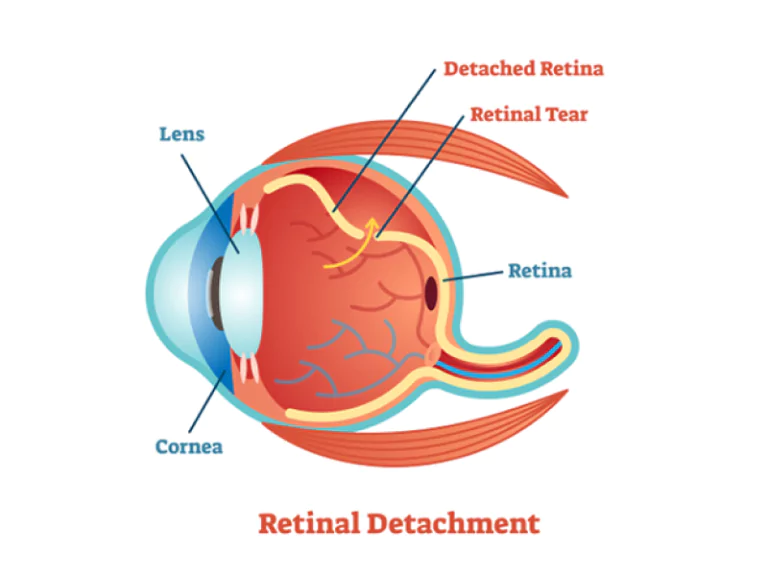
#LIVE2.0 #Review
There is a saying that most of the things we worry about, never end up happening. It’s the one we never worry about that catches us unprepared.
You may not be aware of all the health conditions that might befall you, and retinal detachment may be something that never crosses our mind. It so happens to be a sudden event.
Retinal detachment happens when the retina pulls away from its normal position in the back of the eye. The retina is responsible for sending images to the brain through the optic nerve. When detached, the vision blurs.

A detached retina shouldn’t be taken lightly. If left untreated for too long, it can cause blindness.
The retina is usually placed smoothly and firmly against the inside back wall of the eyeball and functions in a similar manner to the film in the back of a camera. Millions of light-sensitive retinal cells receive the optical images, instantly develop them, and send them ahead to the brains to be seen. Any part of the retina that is pulled away from its normal position is considered detached and will result in some vision loss.
If only a small part of the retina has detached, you may not have any symptoms at all.
Retinal detachment causes blindness if it happens on a bigger scale. This can be when more than a small part is detached. You may not be able to see as clearly as normal, and other sudden symptoms of retinal detachment are:

These warning signs may appear before the retina detaches in the case of minor retinal tears. However, it is almost always spontaneous and happens suddenly. Retinal detachment causes blindness and affects approximately 1 in 10,000.
Anyone can be a target for retinal detachment, yet some people are at a higher risk. You are at risk if:
Other risks include:
Is retinal detachment a common eye condition as a result of this? It isn’t. People who do not have any of the risk factors listed here are unlikely to experience the symptoms of retinal detachment.
A clear collagen gel, called vitreous, fills the eye between the retina and the lens. As we grow older, the vitreous may pull away from its attachment to the retina at the back of the eye.
The three main causes of retinal detachment, which all involve the vitreous, are listed below:
This is the most common cause of retinal detachment. This is when there is only a small tear in the retina. The vitreous travels through the tear and collects behind the retina, pushing it away and detaching it. This cause of retinal detachment happens with age.
Scar tissue on the retina can pull it away from the back of the eye. Such retinal detachments are mainly caused by diabetes. Prolonged high levels of blood sugar damages the blood vessels in the eye and causes the formation of scar tissue. These scars and traction areas can grow, pulling and detaching the retina.
Even in the absence of a tear, the eye fluid begins to accumulate behind the retina. The retina is pushed away as it collects. Fluid accumulation is typically caused by leaking blood vessels or swelling behind the eye.
Treatment depends on the type of retinal detachment and the degree of detachment of your retina. In some cases, more than one type of treatment may be used.
It’s very crucial to understand that if left untreated, retinal detachment causes blindness, which can be rather very swift and sudden.
Retinal tears or holes usually require laser treatment or cryotherapy (freezing), to seal the retina to the back wall of the eye. This treatment helps stop the progression of retinal detachment.
Retinal detachments may require surgeries that would return the retina to its proper position in the back of the eye. The type of surgery depends on the characteristics of the retinal detachment. Following are a few examples of surgeries for retinal detachment:
Permanent vision loss due to retinal detachment is inevitable if left untreated for too long. Hence, retinal detachment is considered an irreversible vision loss and a common cause of low vision.
Most people who have surgery for detached retina regain their eyesight. A small percentage of people may experience a recurrence of symptoms and require a second surgery. Some experience low vision after surgery. This may be caused by the retinal tissue’s altered shape after detachment.
Detached retina can cause a certain degree of permanent vision loss that cannot be corrected with glasses or low vision aids. Hence, visual rehabilitation is used and designed to meet each individual’s requirements.
If retinal detachment causes central or peripheral vision loss, visual therapists train an individual on how to use low vision aids for retinal detachment and adaptive technology for tasks like reading, writing, using a computer, and driving.
Fortunately, low vision aids for retinal detachment are designed to maximize the remaining vision, increase independent functioning and improve the quality of life.
Low vision is defined as 20/200 or worse. The vision is usually not corrected with glasses, contact lenses, or surgery.
Low vision aids and devices help people suffering from different eye diseases or surgeries, to regain their independence for daily activities.
For varying degrees of vision loss, a wide range of low vision aids are available. These low vision aids can be both low-tech and high-tech to facilitate accessibility for people of all ages.
Some of the most popular and common low vision aids are:
Among the many low vision aids for retinal detachment, IrisVision Inspire is among the leading providers of low vision aids with award winning assistive technology. As a lightweight headset, it is designed for anyone with low vision.
Complications or visual deterioration caused by surgeries can, luckily, be overcome with the assistance of low vision aids, designed to improve your visual functioning. As someone facing difficulties getting around with their daily activities due to vision loss, contact IrisVision to find out more about how our low vision aid can help.
Support
See and Connect Today!
IrisVision Global, Inc.
5994 W. Las Positas Blvd, Suite 101
Pleasanton, CA 94588
Email: [email protected]
Support: +1 855 207 6665
Support
See and Connect Today!
IrisVision Global, Inc.
5994 W. Las Positas Blvd, Suite 101
Pleasanton, CA 94588
USA Email: [email protected]
Support: +1 855 207 6665
Support
See and Connect Today!
IrisVision Global, Inc.
5994 W. Las Positas Blvd, Suite 101
Pleasanton, CA 94588
Email: [email protected]
Support: +1 855 207 6665